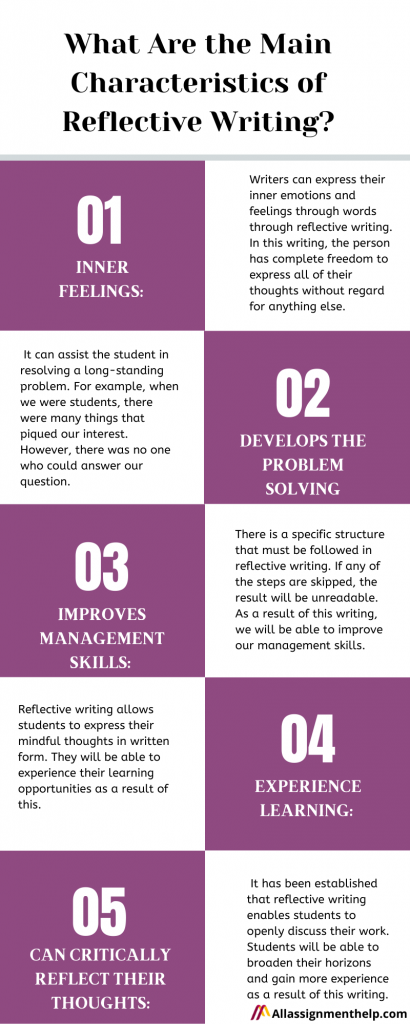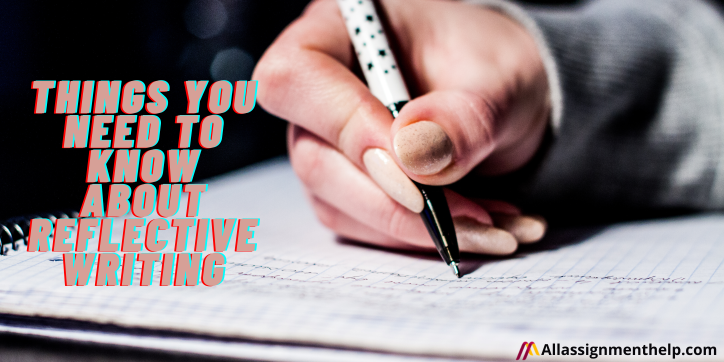Reflective writing is something that all high school and college students should be familiar with because it is required for academic writing. This type of writing assists them in critically developing their ideas into written form. Journals, portfolios, and summaries are all examples of reflective writing that is used in academia. This is all about reflecting on your personal feelings about any of the specific events, topics, or scenes. Examples of reflective writing have various characteristics and structures. All of these factors are critical for writing a well-structured essay on your own. If you omit any of these elements, the reader will be unable to comprehend your written work. It is nearly impossible to write if you lack the necessary knowledge.
If you are having trouble writing your reflective writing on your own or if you want to know all of the factors that are important for this piece of writing, I recommend that you read this blog thoroughly. This blog is been created by Allassignmenthelp.com to assist you with your problem. We covered everything you need to know about reflective writing in this blog post.
“Self-reflection is a humbling process. It’s essential to find out why you think, say, and do certain things…then better yourself.” -Sonya Techlai
What Are the Different Kinds of Reflective Writing?
Students are assigned various types of reflective writing assignments in their academics. So, let us study and learn all of those types of writing in-depth.
- Reflective report: It is a type of writing in which students are given the opportunity to critically express their thoughts on a subject or topic. An individual or a group of people can write and develop this type of assessment project. A reflective report is a traditional report format in which students can express their ideas, emotions, actions, and thoughts. The most important tip for perfect writing is to be open-minded and not be afraid to express all of your thoughts all at once.
- Critical incident analysis: This type of critical incident analysis results in reflective learning. Before writing this, consider the following factors: description, explanation, reflection, and observation. This analysis can be used in classrooms, social work settings, and criminal cases.
- Reflective journal: Reflective journal is prepared on a daily basis or on a weekly basis. It helps the students to develop their thinking and understanding level.
- Experiential Reflection: In this reflective learning, students have the opportunity to interact with the outside world in ways that are directly or indirectly related to their course studies. It can also aid in the development of their personality. This type of reflective writing is essential in fields such as nursing, business, forensic engineering, and financial reporting.
“Writing in a journal reminds me of your goals and your learning in life. It offers a place where you can hold a deliberate, thoughtful conversation with yourself.” -Robin Sharma
Also Read: A Complete Guide on Reflection Paper
What Is the Need to Write Reflective Writing?
Writing reflectively teaches you what you can learn from experience, and the theory described can be applied to practice in your discipline. This can assist you in preconceiving ideas and planning for the future. It can also help you improve your critical thinking skills because this type of writing is all about expressing yourself as clearly as possible. It is critical to strike a balance between descriptive writing and report writing in this case. This is the most effective method for getting to know yourself, your potential, and your understanding. This allows you to improve your formal writing skills, learn how to prove and support your arguments, and how persuade third parties with your words. Most importantly, all of this allows you to express yourself.
“Reflective writing produces distinct rewards. A writer does not claim to live exclusively in the moment. A pensive writer retreats into oneself in noble attempt to meld memory, thought, faith, doubt, and other strong emotions into thought capsules while exploring the inscrutable web of creation.” – Author: Kilroy J. Oldster
Ways to Write Reflective Writing?
Reflective writing may have various forms. It depends on the discipline you are studying and the structure of the assignment. Formal reflective essays or reports have a clear structure that comprises an introduction, body, and conclusion. When it comes to less formal writing such as blogs, discussion entries, or ongoing journals. It may not be structured in the same way.
Let’s further discuss how you can do effective reflective writing.
1- Report the issue and explain the importance of it-
Recount the issue or experience on which you want to reflect. You should describe what happened and write about the context in which it occurred. Before you begin analysing the situation, you must also state your position. In this process you are required to describe or report the issue or the topic and concept. The students can reply to the issue by expressing their opinions and observations.
2- Try to relate the latest issue or experience with the previous ones-
You should emphasise describing a situation similar to one you have faced in the past, and you should also try to relate the current experience to previous ones.
3- Reasoning the things-
Give a reason for the problem to help the other person understand how things work in the discipline under discussion. It is also necessary for you to explain to others how things work in the discipline under consideration. If necessary, you should refer to academic literature. Furthermore, you should discuss your point of view and provide evidence to back it up.
4- Reconstruct the understanding of the experience-
You should also explain the changes you’ve noticed in yourself as a result of a specific experience. You should explain what you would do in the future if you were in the same situation, as well as why.
“Without reflection, we go blindly on our way, creating more unintended consequences, and failing to achieve anything useful.” -Margaret J. Wheatley
Reflective writing may be difficult for you for a variety of reasons. In that case, you can “pay someone to do your homework.” These professional writers will provide you with well-written coursework papers that will help you achieve the highest possible grades.
Some Reflective Writing Topics for Students
In high school and middle school, reflective writing is a very common form of academic writing. The following are some of the common reflective writing topics which are given to the school students. This type of writing can be about relationships, favorite places, first experience, events, nature, personal things, family members, hobbies, and sports. The secret tip for choosing a topic is to choose one that you are familiar with or that you feel comfortable discussing, or you can choose a topic for which you want to find answers. Never choose a topic that will make you feel bored. Because dedication and interest are the two factors that determine the outcome of a piece of writing. As a result, always choose your favorite subject.
- My first bike ride
- My first kiss to my boyfriend
- The worst embarrassment of me
- First picnic with my family
- Favorite international trip
- My favorite restaurant and dish
- My hometown
- Watching the moon
- The best family gathering
- Things that make me stressed
- Talking with someone whom i love the most
- Memorable day of my life
- My worst fear
- My favorite rolemodel
- The happiest day of my life
- A visit to the museum
- Biggest fear
- Playing with my cat
- First day of my school
- What is important for a successful relationship?
The choice of a topic is critical for reflective writing. If you are unsure about which topic to write about for your essay, you can choose from any of the topics listed above. If you are still unable to choose a topic, you may wish to seek assistance. You can “pay someone to do the assignment.” You gain two advantages by enlisting the help of professional writers. The first is that you will achieve the highest possible grades, and the second is that you will gain a thorough understanding of your coursework. This knowledge can be applied to future projects.
Also Read: Tips and Tricks for Writing a Reflective Essay
What Are the Main Characteristics of Reflective Writing?

The following are some of the main characteristics of reflective writing:
- Inner feelings: Writers can express their inner emotions and feelings through words through reflective writing. In this writing, the person has complete freedom to express all of their thoughts without regard for anything else.
- Can critically reflect their thoughts: It has been established that reflective writing enables students to openly discuss their work. Students will be able to broaden their horizons and gain more experience as a result of this writing. The more time we devote to reflective writing, the more opportunities we will have to analyse and reflect on our thoughts.
- Develops the problem solving nature: It can assist the student in resolving a long-standing problem. For example, when we were students, there were many things that piqued our interest. However, there was no one who could answer our question. Students can choose a topic question and find answers to it by conducting appropriate research. I am confident that this path process will be fascinating.
- Improves management skills: There is a specific structure that must be followed in reflective writing. If any of the steps are skipped, the result will be unreadable. As a result of this writing, we will be able to improve our management skills.
- Experience learning: Reflective writing allows students to express their mindful thoughts in written form. They will be able to experience their learning opportunities as a result of this.
- Know yourself better: Here, the student can assess his or her own writing ability. You can recognise both the positive and negative aspects of your work. Positive aspects can be developed and improved to make them better. And the negative things can be identified, corrected, and prevented from happening again in the future.
“We do not learn from experience, we learn from reflecting on experience.” -John Dewey
About Us
If you are a student in need of academic assistance, you have come to the right place. You can easily maintain a proper balance between all of your academic activities with the help of our “do my assignment” service. Furthermore, you can easily submit all of your assignment writing at a specified time. Our services are available to all students, and you can take advantage of them without hesitation. Some of the key features of our assignment writing assistance include: help with all subjects; timely delivery; A+ grades; 24/7 customer care support; plagiarism-free assignments; and error-free work. Our prices are very reasonable, and you can easily take advantage of our services without breaking the bank. The reason for offering low prices is that we understand that students cannot afford to pay high fees for assignment help services.
Frequently Asked Questions
| Question 1: What is the format of reflective writing? Answer: The structure of reflective writing is divided into three sections: introduction, body, and conclusion. The second section consists of body paragraphs, which can be divided into two or three short paragraphs. The final section would be the writer’s conclusion. |
| Question 2: What are the stages of the cycle of reflection? Answer: There are five steps in the reflection cycle. A: The first step is to choose a topic. B: The second step is to describe the problem. C: The third step is question analysis. D: The fourth step is to analyze the various events. E: The fifth and final step is to transform the received data. |
